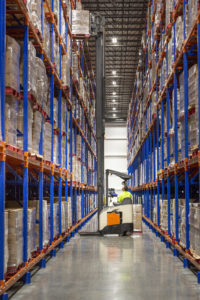Atlanta Bonded Warehouse helps manage the scale of your business with flexible warehousing solutions. Our clients range from small to large companies, each of whom benefit from our superb customer service, extraordinary attention to detail, and more than 75 years of experience in the warehousing and logistics industry. Every year, we handle over 700 million cases and 9 million pallets across our sixteen warehouses nationwide.
Third-party Logistic Georgia Warehousing Services
Atlanta Bonded Warehouse’s services include:
 Multi-Client & Dedicated Warehousing
Multi-Client & Dedicated Warehousing
Atlanta Bonded Warehouse has over 75 years of experience operating both multi-client and dedicated warehousing facilities using our Tier One Warehouse Management System (WMS) or our customer’s proprietary WMS. The primary industries that we serve include confectionary, food, beverage, pharmaceutical/nutraceutical, plastics, and consumer packaged goods (CPG). We offer both ambient (40°F–90°F) and mid-temperature-controlled solutions (55°F–75°F) so you whether you use our Atlanta warehouse campus, or one of our other facilities, you’ll find the solution that will best suit your business needs.
Freight Consolidation
Shipping can be expensive if you go it alone. With freight consolidation, our customers enjoy lower costs by shipping their LTL orders with the LTL orders of other customers to the same destination.
A dependable freight consolidation program is more critical than ever before as retailers request more frequent smaller orders, lead times become shorter, and the penalties for non-compliance become prohibitive. Along with our freight consolidation program for warehouse customers, ABW serves as a pool point for cross-docked orders and offers consolidated order picking for bulk pool shipments.
Cross-Docking
Cross-docking enables products to be transferred from one truck to another or from a railcar to trucks across a staging area within a short amount of time — eliminating the need for longer-term storage. While cross-docking requires multi-modal coordination, it is an effective way to streamline the journey from the product’s point of origin to the point of sale, allowing customers to reduce costs associated with double handling, inventory holding, and warehousing.
Our Atlanta Warehouse Resources
Atlanta Bonded Warehouse manages 7.5 million square feet of space across sixteen facilities in six states. Our Atlanta warehouse campus alone has a capacity of 436,500 pallets, with an expansive staging area for cross-docking applications. Our warehousing solutions are seamlessly integrated with our transportation and co-packaging services.
Warehouse Industry Recognition
- Hershey DC Operator of the Year: six consecutive years
- Wrigley Lifetime Achievement Award
- Named a Top 100 3PL and Cold Storage Provider by Food Logistics Magazine: 8 consecutive years
- Named a Top 100 3PL by Inbound Logistics Magazine: 9 consecutive years
- Named Barilla’s Warehouse Partner of the Year for 2015, 2016 and 2017
- CaseStack’s Warehouse of the Year for 2017 and 2018
Contact us today to consult with one of our logistics experts to learn about our warehousing, co-packaging and transportation services.
3PL Warehousing Frequently Asked Questions
- Do you manage other warehousing facilities outside of the Atlanta Metro?
Yes. Our name is local, but our service knows no boundaries. In addition to our Atlanta campus, we also manage facilities in:
- What does "food grade" warehousing mean?
The US Food and Drug Administration (FDA) sets safety standards for the materials and equipment used to store, prepare, or produce food to prevent foodborne illnesses caused by the contamination or cross-contamination of food and beverages.
Food-grade warehouses are registered with the FDA, subject to regular food safety inspections, keep food products at the appropriate temperatures and adhere to strict FDA standards of cleanliness to keep food products in a good and safe condition.
- What is a temperature-controlled warehouse?
A temperature-controlled warehouse uses heating or cooling systems (HVAC) to maintain exact temperature ranges for storing perishable or non-perishable goods before they are shipped to retailers.
Temperature-controlled warehousing helps protect products from potential spoilage, damage, or contamination caused by fluctuating temperatures. In a temperature-controlled environment, products are more likely to retain their quality, have an extended shelf life, and stay safe for human use or consumption.
Different products require storage at different temperature ranges, which include ambient (40°F–90°F), mid-temperature (55°F–75°F), refrigerated (28°F–42°F), or frozen (0°F and below)
- What are ABW's warehouse temperatures?
Atlanta Bonded Warehouse offers temperature-controlled warehousing solutions for products requiring storage at mid-temperature (55°F–75°F) ranges. We also provide storage at ambient (or “room”) temperatures (40°F–90°F). Examples of mid-temp warehousing products include pharmaceuticals and nutraceuticals, confectionery products, snacks, and beverages, and other products susceptible to high heat and humidity such as rice, pasta, flour, spices, and packaging.
Ambient temperature warehousing solutions are typically dry, clean, and well-ventilated – ideal for storing non-perishable products such as bagged, canned, or glass-pack goods, packaging, and CPG products.
ABW does not offer temperature-controlled warehousing solutions for fresh produce, refrigerated, or frozen products needing to be stored below 50°F.
- What does a warehouse management system (WMS) do?
Warehouse management system (WMS) software enables real-time visibility into a company’s inventory, fulfillment, and shipping operations. It offers superior tracking, planning, integration, and execution of different warehouse processes.
